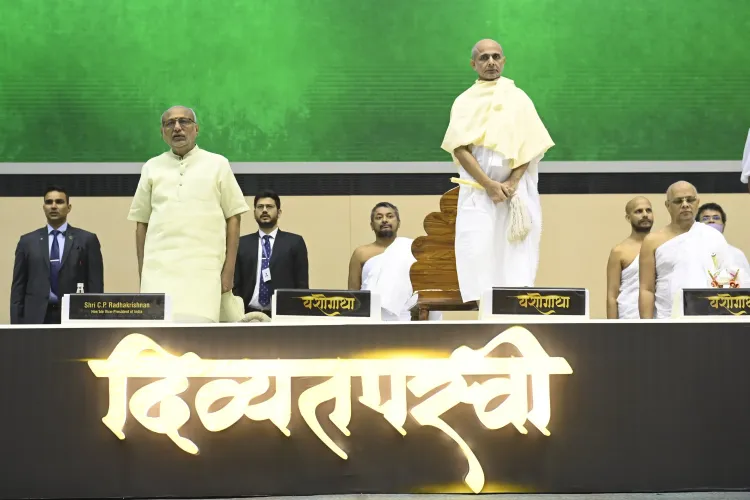What Did Vice President Radhakrishnan Say About Government's Efforts to Preserve Jain Manuscripts?

Synopsis
Key Takeaways
- Government initiatives to preserve Jain manuscripts are crucial for cultural heritage.
- Prakrit's recognition as a classical language enhances its historical significance.
- Jainism's teachings on non-violence and truth influence modern ethical perspectives.
- Acharya Hansratna's teachings promote societal values and unity.
- Vegetarianism is celebrated as a vital aspect of Jain philosophy.
New Delhi, Nov 8 (NationPress) Vice President C. P. Radhakrishnan commended the government's initiatives, under Prime Minister Narendra Modi, to grant ‘Classical Language’ status to Prakrit and to safeguard Jain manuscripts through efforts such as the Gyan Bharatam Mission.
The government awarded the ‘Classical Language’ designation to Prakrit on October 3, 2024, acknowledging its profound historical and cultural significance as a reservoir of ancient literature and its importance in Jain traditions.
Speaking at the Eighth 180 Upvas Parna Ceremony of Jain Acharya Hansratna Surishwarji Maharaj in New Delhi, Radhakrishnan noted that in a digital era that often distances us from our heritage, we must seek inspiration from our spiritual leaders to construct a fair, empathetic, and unified Bharat, built upon lasting values, according to a statement.
He praised Acharya Hansratna Surishwarji Maharaj for exemplifying that genuine strength is rooted not in wealth or status, but in restraint, compassion, and discipline. He asserted that Acharya ji’s “Save Culture, Save Family, Build Nation” initiative motivates society to uphold values, fortify families, and cultivate a resilient nation.
Radhakrishnan also highlighted the historical significance of Jainism in Tamil Nadu and its vast influence on Tamil culture.
The Vice President remarked that Tamil Nadu possesses a deep historical bond with Jainism, visible in Sangam literature, epics such as Silappathikaram, the contributions of Jain poets, and ancient temples that stand as evidence of our pluralistic heritage.
He pointed out that Jainism made notable contributions to Tamil literature during the Sangam and post-Sangam epochs, referencing classical works like Silappathikaram by Ilango Adigal and Perungathai by Kongu Velir, which embody the philosophical and ethical tenets of non-violence, truth, and renunciation.
He also cited that texts like the Tirukkural and Sangam literature exhibit Jain influences.
Radhakrishnan emphasized the existence of numerous Jain monasteries in Tamil Nadu, which historically acted as centers of learning, according to the statement.
Acharya Hansratna Surishwarji Maharaj is a respected Jain monk recognized for his spiritual discipline and long-standing ascetic practices.
The Mahaparna signifies the ceremonial conclusion of his 180-day fast, undertaken for the eighth time, reflecting his devotion, discipline, and commitment to disseminating the principles of Jainism and moral values. This event symbolizes faith, self-restraint, and inspiration for both devotees and the broader community.
Highlighting the significant contributions of Jainism, one of the world’s oldest religions, Radhakrishnan noted that its teachings—Ahimsa (non-violence), Satya (truth), Aparigraha (non-possessiveness), and Anekantavada (multiple perspectives on truth)—have profoundly impacted India and the globe.
He remarked that Ahimsa, embraced by Mahatma Gandhi during India’s freedom movement, continues to inspire global peace initiatives.
The Vice President further highlighted that the Jain philosophy of vegetarianism, compassion towards animals, and sustainable living has garnered global recognition as a model for environmental responsibility.
Reflecting on his personal journey, Radhakrishnan shared that he adopted vegetarianism 25 years ago after visiting Kashi, observing that it fosters humility, maturity, and love for all beings.










